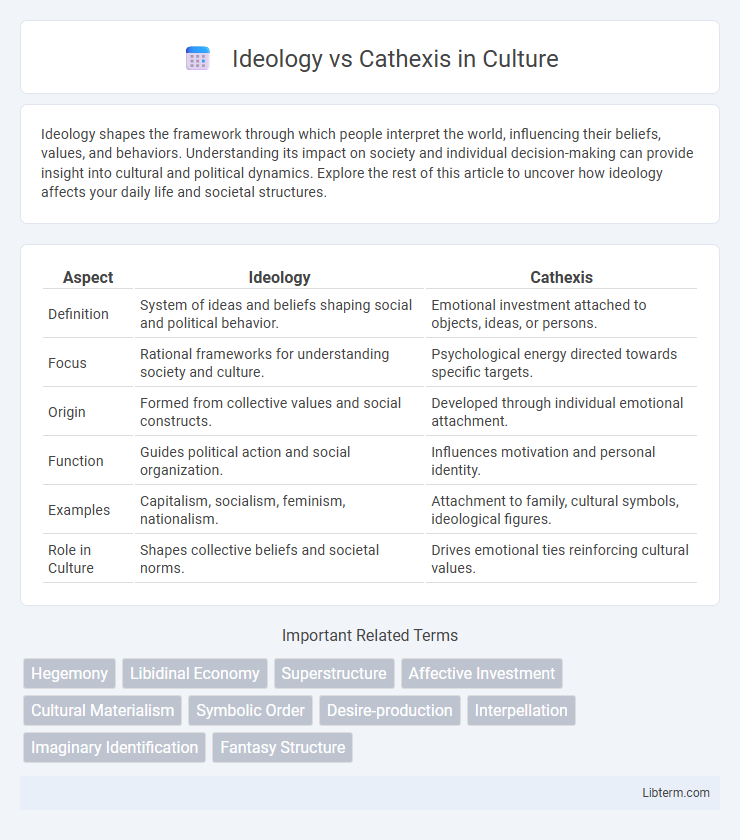Ideology shapes the framework through which people interpret the world, influencing their beliefs, values, and behaviors. Understanding its impact on society and individual decision-making can provide insight into cultural and political dynamics. Explore the rest of this article to uncover how ideology affects your daily life and societal structures.
Table of Comparison
| Aspect | Ideology | Cathexis |
|---|---|---|
| Definition | System of ideas and beliefs shaping social and political behavior. | Emotional investment attached to objects, ideas, or persons. |
| Focus | Rational frameworks for understanding society and culture. | Psychological energy directed towards specific targets. |
| Origin | Formed from collective values and social constructs. | Developed through individual emotional attachment. |
| Function | Guides political action and social organization. | Influences motivation and personal identity. |
| Examples | Capitalism, socialism, feminism, nationalism. | Attachment to family, cultural symbols, ideological figures. |
| Role in Culture | Shapes collective beliefs and societal norms. | Drives emotional ties reinforcing cultural values. |
Understanding Ideology: Definition and Scope
Ideology encompasses a system of beliefs, values, and ideas that shape political, social, and cultural perspectives within a society. It functions as a framework guiding individual and collective behavior, influencing identity and power relations across different contexts. Understanding ideology involves analyzing its role in constructing meaning, legitimizing authority, and mobilizing social groups toward shared goals.
What is Cathexis? A Psychological Perspective
Cathexis refers to the investment of emotional energy in a person, idea, or object, central to psychoanalytic theory. It represents the attachment or binding of psychic energy to mental representations, influencing behavior and motivation. Understanding cathexis reveals how unconscious emotions shape conscious interactions and psychological dynamics.
Ideology vs Cathexis: Key Differences
Ideology refers to a system of ideas and beliefs that shape social and political perspectives, whereas cathexis involves the emotional investment of psychic energy in objects or ideas. The key difference lies in ideology's predominance of cognitive structures guiding behavior, contrasted with cathexis's emphasis on affective attachment influencing motivation. Understanding these distinctions aids in analyzing how deeply held beliefs versus emotional investments impact individual and collective actions.
Historical Roots of Ideology
The historical roots of ideology trace back to the Enlightenment, where systems of thought emerged to explain social, political, and economic orders, serving both as frameworks for understanding and instruments of power. Ideology functions as a structured set of beliefs shaping collective identities and guiding political action, contrasting with cathexis, which involves emotional investment in ideas or objects. Understanding ideology's evolution reveals how political movements harnessed ideas not only rationally but also emotionally, blending cognitive structures with cathexis for social influence.
Cathexis in Freudian Theory
Cathexis in Freudian theory refers to the investment of psychic energy in objects, ideas, or individuals, serving as a key mechanism for emotional attachment and desire. Unlike ideology, which encompasses a system of beliefs or ideas, cathexis specifically describes the unconscious allocation of libido that shapes behavior and subjective experience. Freud emphasized that disruptions or fixations in cathexis can lead to neuroses, highlighting its critical role in the dynamics of the psyche.
How Ideologies Shape Societal Norms
Ideologies fundamentally shape societal norms by providing structured belief systems that guide collective behavior and social expectations. These frameworks influence how individuals invest emotional energy, or cathexis, into cultural symbols, institutions, and ideologies themselves, reinforcing conformity and social cohesion. The interplay between ideology and cathexis ensures that societal norms are both cognitively accepted and emotionally upheld, sustaining a stable social order.
The Role of Cathexis in Emotional Investment
Cathexis involves the allocation of emotional energy toward an object, person, or idea, playing a crucial role in shaping individual psychological commitment. Unlike ideology, which consists of structured beliefs and values, cathexis drives the depth of one's emotional investment, influencing motivation and personal attachment. This emotional bonding intensifies how individuals internalize experiences and engage with their environment, affecting behavior and decision-making processes.
Ideological Influence on Personal Beliefs
Ideological influence shapes personal beliefs by framing individual values within broader social, political, or cultural narratives that guide perceptions and behaviors. The internalization of ideology directs emotional investments, or cathexis, toward ideas, symbols, and institutions that reinforce identity and social cohesion. This dynamic interplay ensures that ideologies not only inform cognition but also emotionally anchor personal convictions, affecting decision-making and worldview.
Cathexis and Its Impact on Human Motivation
Cathexis represents the investment of mental or emotional energy in a person, object, or idea, shaping human motivation by directing focus and attachment toward specific goals or desires. This emotional charge influences decision-making, reinforcing behaviors that align with deeply held values and unconscious needs. Understanding cathexis reveals how affective investments drive persistent motivation, often surpassing purely rational considerations.
Integrating Ideology and Cathexis in Social Dynamics
Integrating ideology and cathexis in social dynamics reveals how collective belief systems shape emotional investments in group identities, driving social cohesion and conflict. Ideological frameworks provide structured narratives that organize individual cathexes, channeling emotional energy towards shared symbols and goals. This synthesis enhances understanding of social movements, as emotional attachment to ideological causes fuels mobilization and sustains collective action.
Ideology Infographic

 libterm.com
libterm.com